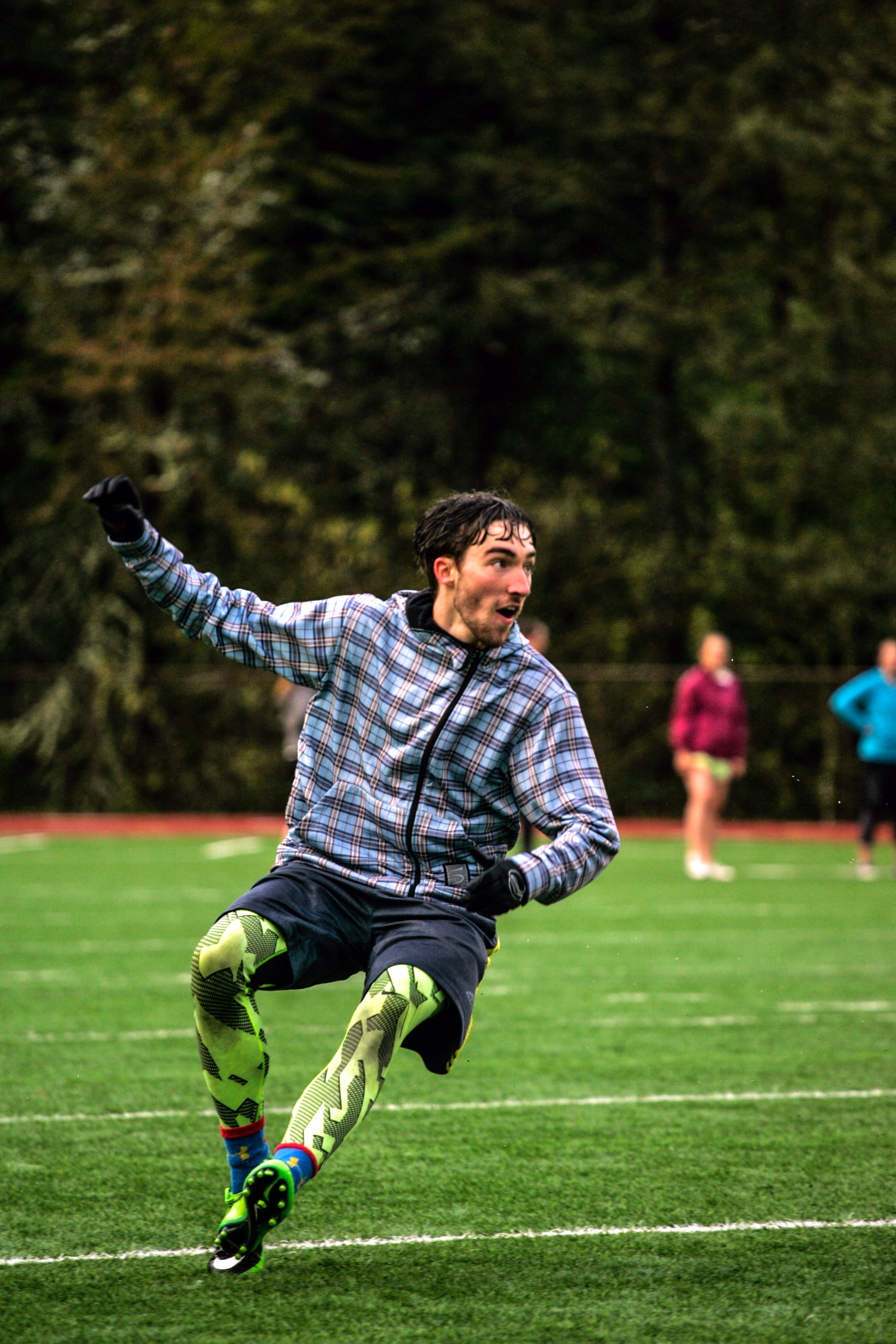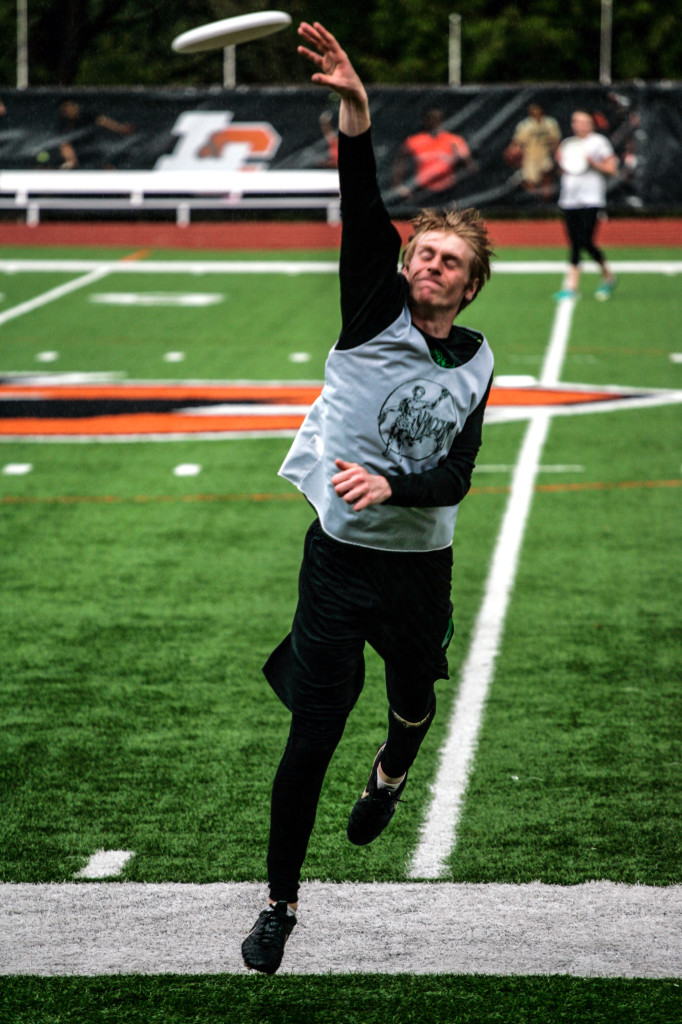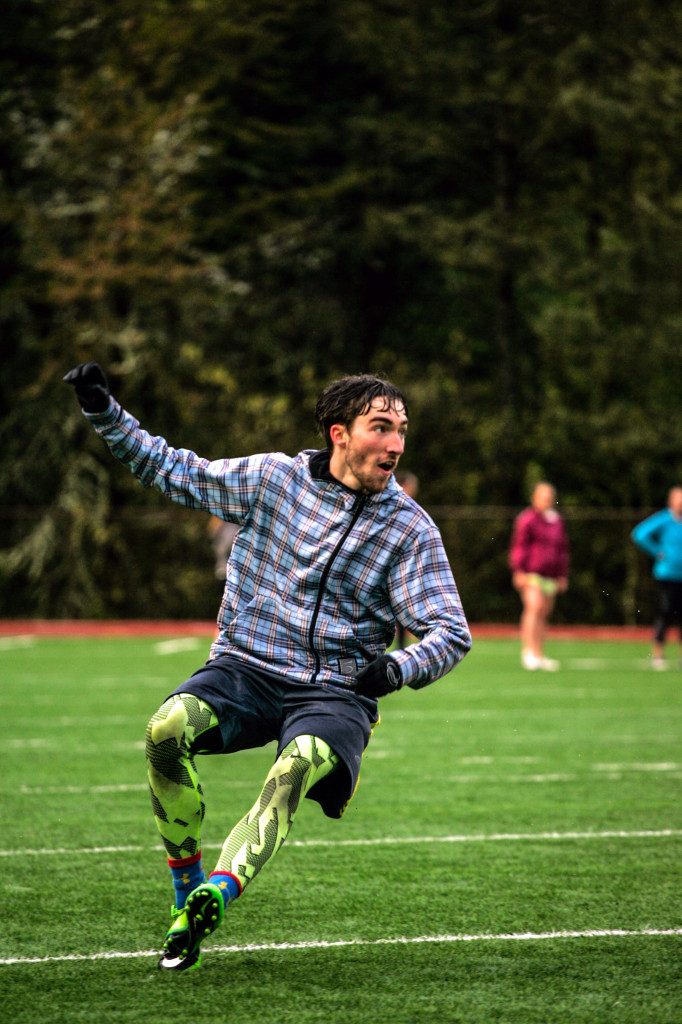
By Caleb Diehl /// Managing Editor
At 13-13 in a muddy Ultimate Frisbee game against Simon Fraser University, Kyle Barton (’14) and Bacchus Ultimate were slipping, sliding and arguing with the Canadians, a hardworking but edgy bunch. Everyone was getting messy and mad. With the game-winning point in sight, Bacchus had just turned it over twice.
The seven Lewis & Clark players led one last drive downfield. Sam Franer (’14) bolted to the endzone, as Barton broke his mark and tossed the disc into space. He waited the few seconds it takes a Frisbee to float to its man. Then Franer grabbed it. Barton, a sophomore at the time, counts the game among his most memorable.
For a group of college men named after the Greek god of wine and merriment, Bacchus still takes care of business. The team’s weekly regimen of weight workouts, sprints and drills has landed them a spot in the Division III Nationals tournament in Columbus, Ohio.
Speed is one way Bacchus does damage—the other is breaking the mark. The long hang time of a Frisbee forces defenders to cover large chunks of territory. To make it easier, most teams force to the sidelines. On a flick mark, a defender moves to one side of his man, cutting off his forehand throw. Left with only backhands, the offense sacrifices turf with every pass. Bacchus practices breaking the mark, throwing a forehand around the defender to free up options.
Defense is less complicated. “We just try to play balls out,” Barton said.
On game day, Ben Whitenack (’16) tosses his cleats, dry socks and jersey into a painter’s bucket and tows his speakers to blast rap during warm-ups. The team breaks a pineapple before the game, because they accidentally smashed one at a good tournament. Bacchus doesn’t keep a bench, not in the traditional sense. Subs pace the sidelines, shouting a call and response.
Few Bacchus players thought of Frisbee as a competitive sport before college. A Frisbee team, Barton said, is a “combination of athletes that are also kind of nerds.” Many came off their high school track or basketball teams. Whitenack ran the 400m, 800m and 1500m. Now he races defenders downfield for long throws, one on one.
Years before, LC had an Ultimate team only in the loosest sense of the word. Men’s Frisbee, one story goes, was ruled by Chicken Skin, a cast of unsavory characters and downright assholes. A group of young players arrived, calling themselves Bacchus and looking to crank up the competition. The two clubs played for the right to represent the school. When the field cleared, the young guys came out on top.
That’s typically how Frisbee disputes work out—between players, not referees. The sport thrives on the “spirit of the game,” an understanding that players will call their own fouls and respect the calls of opponents.
For modern-day Bacchus, Barton puts in eight to ten hours each week in practices, scrimmages and the weight room. For explosiveness, he does deadlifts, hang cleans and squats. Sometimes he takes the team to the track for eight 100-meter sprints, or a set of 400s. Over the summer, he plays on a club team for 15 hours a week.
At Nationals on May 17 and 18, among a host of private colleges, Bacchus will face the St. Olaf and Carleton Frisbee machines from Minnesota. They’ll do a Safeway run and stock up on water before playing seven straight games in one weekend, fighting injuries and the wind. Whitenack will be out to avenge a loss to Carleton, counting on the team’s newfound mental strength. By now, he said “even after a tough loss, we can just come back and play hard.”
Barton’s played with Bacchus four years and learned to deal with challenges. But some things haven’t changed since he walked onto the field in high school.
“It was this great community,” he said. “It was just a place to kind of belong.”

Photo by: Mat Barry

Photo by: Mat Barry
Caleb Diehl is the managing editor of The Pioneer Log. His work has also appeared in The Park Record and on the Lewis & Clark School of Education and Counseling webpage. He is a contributing writer to the LC Journal for Social Justice. Follow Caleb on Twitter @calebsdiehl
Subscribe to the Mossy Log Newsletter
Stay up to date with the goings-on at Lewis & Clark! Get the top stories or your favorite section delivered to your inbox whenever we release a new issue.

Leave a Reply